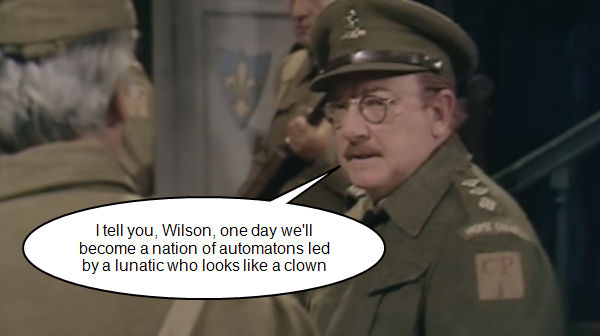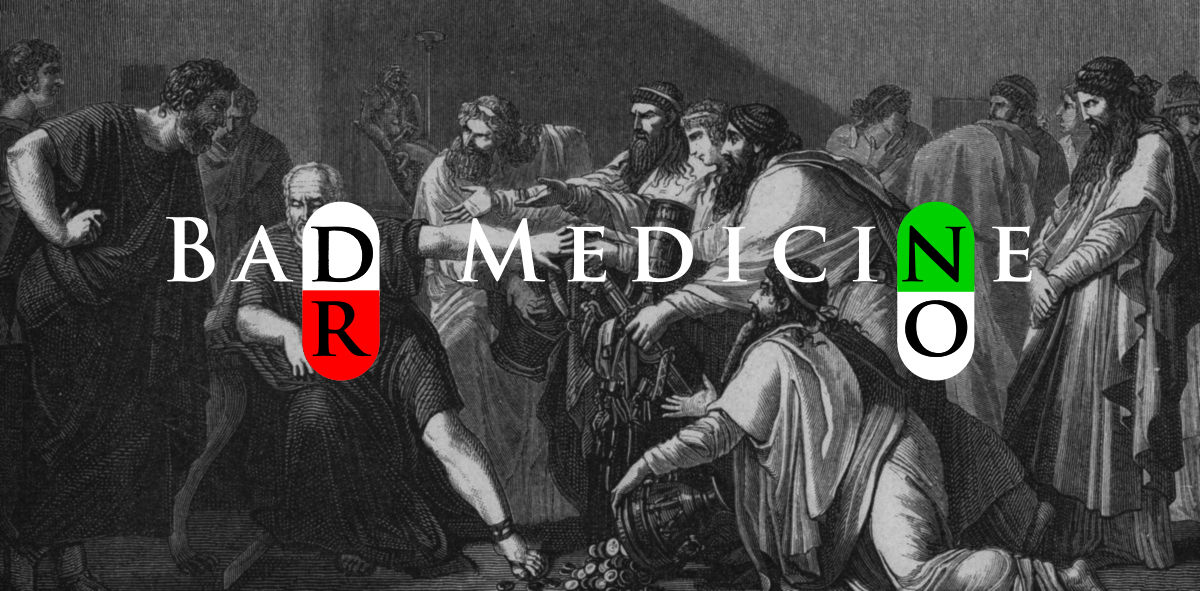The Perils of Panic Medicine

Dr No has never been much of a ‘stand back, I’m a doctor’ sort of doctor. In his first house job, asked by excitable relatives whether a patient was on the Danger List, Dr No replied that he didn’t have a Danger List, but if he did, he supposed the patient might be on it. By far the greatest clinical teacher Dr No came across in his early formative years was a surgeon who taught Dr No, at the time hell bent on a career in obstetrics, a red shirt and brown trousers specialty if ever there was one, that the most important skill for a surgeon, given basic competence, was to know when to operate. Any fool can dive in right away, but the better surgeon knows when to operate: maybe now, maybe in a few hours days or weeks, maybe never.
The principle that guides the better surgeon answering the question of when is prudence. Dr No first encountered prudence not in medicine, but in sailing — the young Dr No-to-be skippered small boats across the English Channel even before he qualified as a doctor — as part of a magnificent foreword, since removed from later editions, to the 1967 first edition of K. Adlard Coles’ classic Heavy Weather Sailing. Pondering the necessary attributes of the competent seafarer, Alasdair Garrett, then editor of the Journal of the Royal Cruising Club, wrote (Dr No quotes the passage at length, because it illustrates how similar seafaring and medicine are: change a handful of words and the passage works equally well for the practice of medicine):
“Indeed, the sea demands definite qualities in the seafarer — certain attitudes of mind and character. Humility, prudence and a recognition that there is no end to learning and to the acquisition of experience. Humility I put first, for who would dare to be other than humble in the presence of two great elements — of sea and sky and all the uncertainties which they hold for us? Prudence comes second — it is the ingrained characteristic of the professional seaman — and I would define it as the ability to distinguish between the risk that can reasonably be accepted having regard to prevailing conditions and the risk which must be rejected as unacceptable. Lastly, learn by your own experience and by the experience of others, for there is never an end to your learning.”
Prudence and the when question applies of course to all medicine, not just surgery. A good doctor needs the ability to know when to examine an abdomen, or order a diagnostic test, or prescribe, or implement a public health measure — and an understanding that the range of possible answers to when includes never.
The reason doctors need prudence is that most doctors by nature are doers. Give a doctor a hammer, then very soon every patient will look like a nail, to be hammered into the ground, alas, some six feet under. Give doctors statins, then very soon every adult will look as if their cholesterol is on the high side, and, alas, far too many patients will end up taking pills they don’t need. Make available PSA testing, and very soon every male over fifty will look like they might have prostate cancer, and, alas, far too many will end up on the Great Prostate Train Crash journey. We guard against such calamities by practising prudently, by asking when, if ever, should we follow this particular course of action. It is prudence — distinguishing between the risk that can reasonably be accepted having regard to prevailing conditions and the risk which must be rejected as unacceptable — that guards against the doctor’s natural exuberance, their native urge to action.
Nowhere, bar nowhere, is prudence more important than in a pandemic. Give a public health doctor a pandemic, and very soon every person will look like they have got, or are soon going to get, the disease, most likely fatally. Add novelty, and with it inevitable uncertainty of fact, and the conditions are ripe for what some much cleverer than Dr No might dub a panicdemic — a veritable orgy of extreme hand wringing and bed-wetting, of panic. We enter the alarming realm of panic medicine.
Garrett’s definition of prudence uses the word reasonably, and in panic medicine, the first casualty is reason. The measured practice of prudent medicine flies out of the window, discarded like a medieval housewife’s bedroom slops. The fantastical forecasts of the numerolgical futurologists bewitch, and the bewitched clamour for ever more draconian measures, wrapped up in evidence that makes wet paper bag packaging look robust. The petulant and controlling so called precautionary principle — one of Dr No’s bête noires, since carried to its logical conclusion, it can only mean best not to be born in the first place, as a precaution against future misfortune — is hailed as the clarion call to action only to mutate into a call for reckless practices, and we arrive in a bizarre inside out upside down Alice in Wonderland world in which recklessness is championed on the back of precaution.
It is precisely because of this breakdown in sensible practice, aggravated by fear and uncertainty, that we need to emphasise prudent practice more than ever in times of panic. Instead of focusing on the nonsense of ‘staying safe’ (same problem as the precautionary principle, only way to stay safe for ever is not to be born), we need to focus on ‘being sensible’, in all possible senses of the word sensible, on ‘being prudent‘. It means asking when, if ever, to introduce any measure; or, as Garrett might have said had he been writing about public health medicine, distinguishing between the measure that can reasonably be introduced having regard to prevailing conditions and the measure which must be rejected as unacceptable.
Reckless practice is the greatest peril in panic medicine. To borrow again from the overlap between the worlds of seafaring and medicine, it is no different to the panicking seafarer caught suddenly and unexpectedly in fog, who, disorientated and confused, throws open the throttles to escape the fog, only to crash into the rocks. Not a good outcome. Far better instead to be a prudent seafarer: slow down, gather the evidence, determine your position, and only then proceed at a sensible speed in a prudent direction.

I like this piece very, very much. Where would we be without wonderful seafaring analogies? And where could we be right now if more politicians, et al, had ever been to the real and humbling sea? (Only not on my boat…prudence would ban them to the pontoon.)